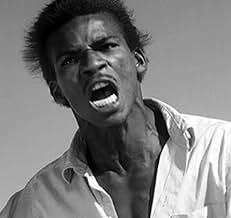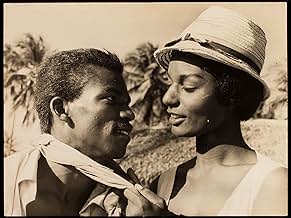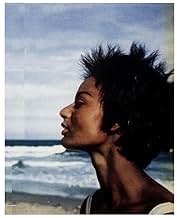Em uma cidade da Bahia um homem negro instruído retorna à sua aldeia de pescadores para tentar libertar as pessoas do misticismo, em particular da religião do Candomblé, que ele considera um... Ler tudoEm uma cidade da Bahia um homem negro instruído retorna à sua aldeia de pescadores para tentar libertar as pessoas do misticismo, em particular da religião do Candomblé, que ele considera um fator de opressão política e social.Em uma cidade da Bahia um homem negro instruído retorna à sua aldeia de pescadores para tentar libertar as pessoas do misticismo, em particular da religião do Candomblé, que ele considera um fator de opressão política e social.
- Direção
- Roteiristas
- Artistas
- Prêmios
- 1 indicação no total
Antonio Pitanga
- Firmino
- (as Antonio Sampaio)
- Direção
- Roteiristas
- Elenco e equipe completos
- Produção, bilheteria e muito mais no IMDbPro
Avaliações em destaque
Okay this is from the time that New Wave was sweeping European festival screens, the time Marxism was sweeping Latin American politics. The French at the time were looking into the intricacies of self, the notations that modern self splinters into. This works on another plane.
It is primarily centered on ritual, it offers a ritualized take of the struggles of life.
There is first the fishing, the joy of collective work. The place is a small fishing community off the coast of Bahia, untouched by modernity, nothing but ocean and palm trees, a place where slaves were unloaded time ago and all that has really changed generations later is that they are loaned a ramshackle fishing net by a merchant to go fishing with for the reward of keeping some of the fish for themselves.
They have kept the dances, one of them is samba, something that must have evolved from slave songs, it bears the call and response format, it sublimates hardship. Another ritual here. Gathered in a circle in the open air, old and young take turns entering the circle and doing a small dance, nothing elaborate, sloppy even, purely for the joy of airing the body, letting the toil pour itself out from the hips and limbs.
A third ritual. They have kept the magical belief from Africa, santeria, again the dance, the chanted call and response but now a sea goddess may be listening and has to be appeased. It's here that a muddled sense enters the picture. The samba was simple and exhilarating, it meant itself. Here we stretch to understand that the natives understand deeper forces to be moving their world.
Three rituals, rites that invite passage, that gradually introduce different facets of the forces that move this world.
A narrative is shaped behind these rituals. It's about a radical who has been to the city and back and urges the natives to throw the bonds of oppression. This is the typical Marxist message. In Soviet films he would have been the statuesque hero, bearer of revolution gospel to the oppressed. But this one is a seething scoundrel who plots murder. He berates their voodoo but only after he has tried it himself and the spell didn't work. Religion is seen as superstition, a meandering cycle to appease the sea instead of facing the real cause of worldly suffering.
A sense of powerful metaphysics begins to cloud the film. The notion is that there are no gods that move here, only the movements of ignorant mind groping with the horizon. The result is uncanny. Where we try to read metaphor into these cinematic flows of the sea, there's nothing. There's only their belief, their woe and confusion that creates these flows, no meaning outside what they are. This is no Stromboli; no Tempestaire; but cinematic space equally reveals inmost self.
So, why have this agitated man mouth off about revolution and not a more noble representative? Why tangle us and confuse instead of clearly present conflict? Because it may be a way of saying that if you hope to awaken people, you'll have to get tangled up in their world, and that doing this falls on people as confused and unenlightened.
Rocha works a powerful double perspective. The Marxist hero as another ignorant being, ignorance as the loss of self into ritualized perceptions, into emotional turbulence we create. And the whole is filmed out of sympathy for the oppressed from inside their elliptical world so that we lose the superficial certainty of the cause and message.
It's a powerful exercise on ignorance. It works - we leave it muddle- minded and uncertain ourselves.
This filmmaker, Rocha, his political leanings are unmistakable, but he's not complacent like Godard, he does not take easy shots. Even in this early film, he mulls over the difficulties, he leaves unreflective room; the radicalist's plot works but it's at the back of conniving and death. It pays off with more intimate, more personal value in Terra em Transe.
It is primarily centered on ritual, it offers a ritualized take of the struggles of life.
There is first the fishing, the joy of collective work. The place is a small fishing community off the coast of Bahia, untouched by modernity, nothing but ocean and palm trees, a place where slaves were unloaded time ago and all that has really changed generations later is that they are loaned a ramshackle fishing net by a merchant to go fishing with for the reward of keeping some of the fish for themselves.
They have kept the dances, one of them is samba, something that must have evolved from slave songs, it bears the call and response format, it sublimates hardship. Another ritual here. Gathered in a circle in the open air, old and young take turns entering the circle and doing a small dance, nothing elaborate, sloppy even, purely for the joy of airing the body, letting the toil pour itself out from the hips and limbs.
A third ritual. They have kept the magical belief from Africa, santeria, again the dance, the chanted call and response but now a sea goddess may be listening and has to be appeased. It's here that a muddled sense enters the picture. The samba was simple and exhilarating, it meant itself. Here we stretch to understand that the natives understand deeper forces to be moving their world.
Three rituals, rites that invite passage, that gradually introduce different facets of the forces that move this world.
A narrative is shaped behind these rituals. It's about a radical who has been to the city and back and urges the natives to throw the bonds of oppression. This is the typical Marxist message. In Soviet films he would have been the statuesque hero, bearer of revolution gospel to the oppressed. But this one is a seething scoundrel who plots murder. He berates their voodoo but only after he has tried it himself and the spell didn't work. Religion is seen as superstition, a meandering cycle to appease the sea instead of facing the real cause of worldly suffering.
A sense of powerful metaphysics begins to cloud the film. The notion is that there are no gods that move here, only the movements of ignorant mind groping with the horizon. The result is uncanny. Where we try to read metaphor into these cinematic flows of the sea, there's nothing. There's only their belief, their woe and confusion that creates these flows, no meaning outside what they are. This is no Stromboli; no Tempestaire; but cinematic space equally reveals inmost self.
So, why have this agitated man mouth off about revolution and not a more noble representative? Why tangle us and confuse instead of clearly present conflict? Because it may be a way of saying that if you hope to awaken people, you'll have to get tangled up in their world, and that doing this falls on people as confused and unenlightened.
Rocha works a powerful double perspective. The Marxist hero as another ignorant being, ignorance as the loss of self into ritualized perceptions, into emotional turbulence we create. And the whole is filmed out of sympathy for the oppressed from inside their elliptical world so that we lose the superficial certainty of the cause and message.
It's a powerful exercise on ignorance. It works - we leave it muddle- minded and uncertain ourselves.
This filmmaker, Rocha, his political leanings are unmistakable, but he's not complacent like Godard, he does not take easy shots. Even in this early film, he mulls over the difficulties, he leaves unreflective room; the radicalist's plot works but it's at the back of conniving and death. It pays off with more intimate, more personal value in Terra em Transe.
Você sabia?
- ConexõesEdited into A Edição do Nordeste (2023)
Principais escolhas
Faça login para avaliar e ver a lista de recomendações personalizadas
Detalhes
- Data de lançamento
- País de origem
- Idioma
- Também conhecido como
- The Turning Wind
- Empresa de produção
- Consulte mais créditos da empresa na IMDbPro
- Tempo de duração1 hora 18 minutos
- Cor
- Mixagem de som
- Proporção
- 1.37 : 1
Contribua para esta página
Sugerir uma alteração ou adicionar conteúdo ausente



















